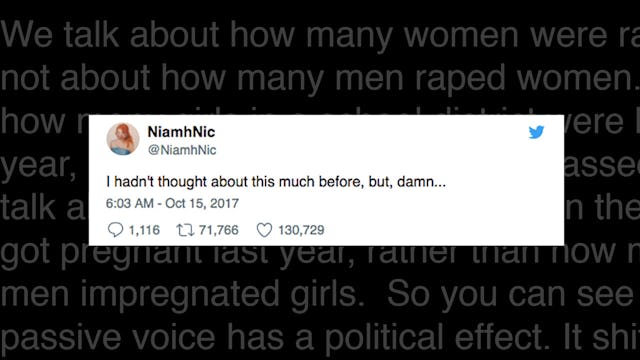Viral Post On How We Speak About Sexual Assault Is Blowing Everyone's Mind

The way we talk about violence against women matters
It has been a difficult few weeks for people who have experienced sexual assault and harassment. The Weinstein allegations inspired so many women to step forward, first by telling their own stories of workplace harassment, then with #MeToo — a hashtag re-ignited by Alyssa Milano to inspire women to reveal just how many of us have dealt with harassment and abuse. (The movement was initially started 10 years ago by activist Tarana Burke.)
The sheer numbers of women coming forward to tell their stories is empowering — but crippling, too. It’s overwhelming to think about just how much shit we deal with as women — at times, it feels impossible to overcome. But there’s a reason it feels that way. The way we treat women is so oppressive, it’s even woven into the way that we speak. And you may have never even noticed it before.
Author and lecturer Jackson Katz speaks about violence against women, and how it’s really a men’s issue. This week, a quote of his is going viral because it speaks to the magnitude of the problem we have in this country — and everywhere.
“We talk about how many women were raped last year, not about how many men raped women.
“We talk about how many girls in a school district were harassed last year, not about how many boys harassed girls. We talk about how many teenage girls in the state of Vermont got pregnant last year, rather than how many men and boys impregnated teenage girls.
“So you can see how the use of the passive voice has a political effect. It shifts the focus off of men and boys and onto girls and women. Even the term ‘violence against women’ is problematic. It’s a passive construction; there’s no active agent in the sentence.
“It’s a bad thing that happens to women, but when you look at that term ’violence against women,’ nobody is doing it to them. It just happens to them. Men aren’t even a part of it.”
The way that we speak about these things, the onus is always on women. Which is interesting, considering that we refuse to let women have agency over their own bodies. We legislate their right to birth control and reproductive choices. We make women’s health a political issue — and the men in power have an overwhelming say. But when we speak about any of the ways a woman is violated, or even impregnated — our gendered language is unbelievable. Men are no where to be found. Victims abound, but perpetrators are virtually non-existent.
How many women were raped?
How many teenage girls got pregnant?
How many women experience workplace harassment?
These constructs are so passive. Imagine the alternative:
How many men rape women every day?
How many teenage boys impregnate girls yearly?
How many men harass women in the workplace?
Just changing the way we speak about these things shifts the power dynamic quite a bit. Things are not just happening to us. “Violence against women” isn’t a woman’s issue — it’s a societal one. And it damn sure is a men’s one, too.
Here’s Katz’s TED talk about violence against women — and how it’s a men’s issue.
“The whole range of issues that are referred to in shorthand as gender violence issues, they’ve been seen as women’s issues that some good men help out with,” Katz says. “I don’t accept it. I don’t see these as women’s issues… in fact — I’m going to argue that these are men’s issues, first and foremost.”
“In domestic and sexual violence men have been erased from so much of the conversation about a subject that is centrally about men.”
And we have a right to question why men are so seldom held accountable — even in language.
This article was originally published on